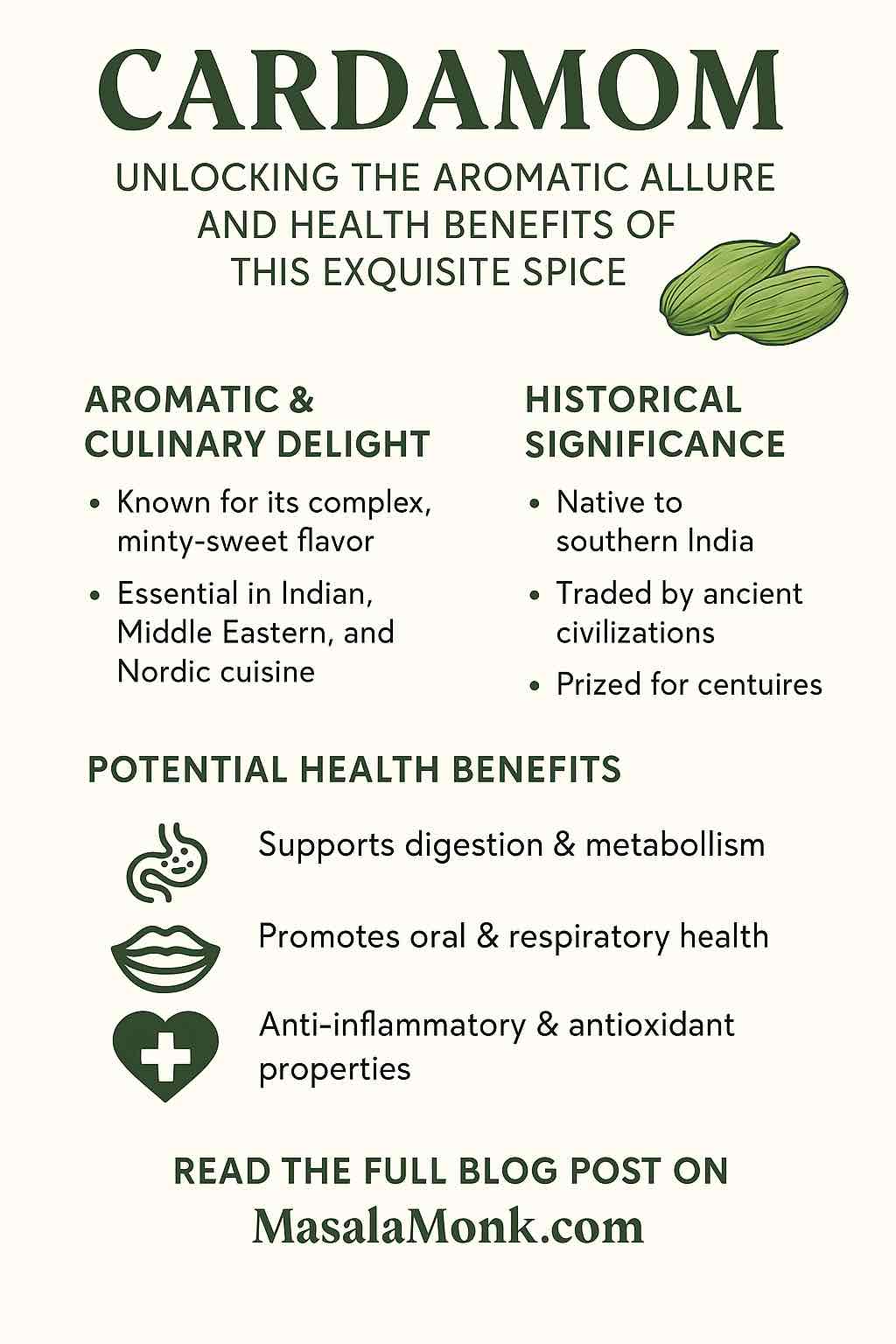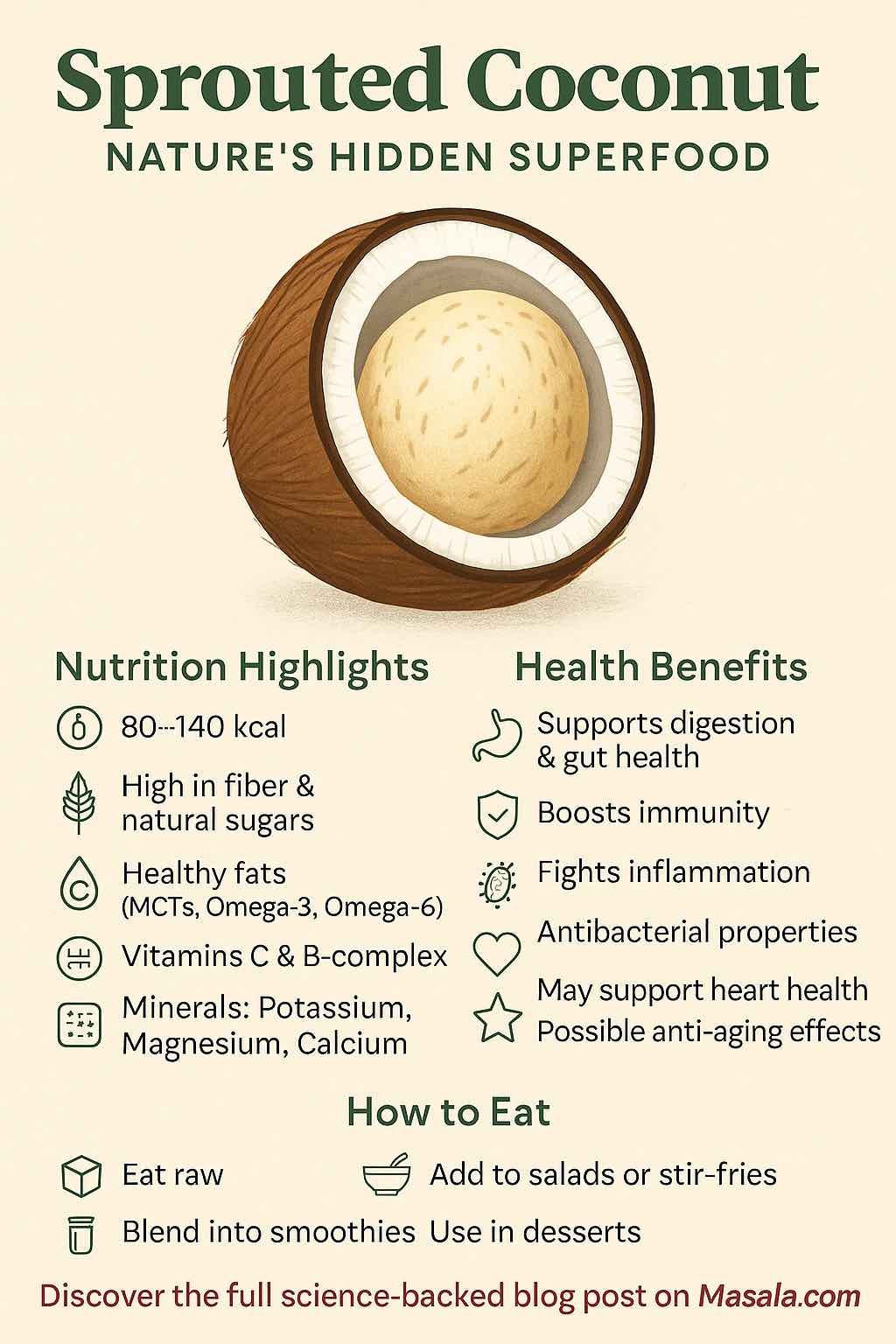
If you’ve ever enjoyed the fragrant notes in a cup of chai, tasted the warmth of Middle Eastern desserts, or savored an aromatic curry, you’ve likely encountered cardamom. But what if I told you this humble spice does far more than delight your taste buds?
Welcome to the world of cardamom tea—a traditional brew gaining new attention for its science-backed health benefits. In this blog, we’ll explore the latest research, real-world tips, and step-by-step brewing guides to help you unlock the full power of cardamom tea.
What Is Cardamom Tea?
Cardamom tea is made by steeping cardamom seeds or pods—alone or with other ingredients—in hot water. The result is a fragrant, slightly sweet, and spicy infusion prized in India, the Middle East, and now worldwide. While you can enjoy it on its own, it often appears in masala chai blends, Turkish coffee, or as a digestive after meals.
The Science: Why Cardamom Tea Is a Rising Star
1. Heart Health & Blood Pressure
The latest clinical trials and meta-analyses (2023–2024) reveal cardamom’s gentle but real effect on cardiovascular wellness:
- Regular intake (about 3 g/day of powdered seeds for 8–12 weeks) may modestly reduce both systolic and diastolic blood pressure—even in those with mild hypertension.
- Antioxidant compounds and natural diuretic properties in cardamom support vascular health, helping your heart work efficiently.
Practical Tip:
If you have mild high blood pressure, ask your healthcare provider if cardamom tea might be a safe, tasty addition to your wellness routine.
2. Potent Anti-inflammatory and Antioxidant Properties
Cardamom is loaded with phytochemicals such as 1,8-cineole and α-terpineol:
- These compounds neutralize free radicals, reducing inflammation and potentially lowering your risk of chronic diseases.
- Meta-analyses show cardamom supplementation consistently lowers blood markers of inflammation (like C-reactive protein).
Practical Tip:
Combine cardamom tea with turmeric or ginger for a delicious anti-inflammatory powerhouse.
3. Digestive Relief
A time-honored digestive aid, cardamom tea:
- Soothes bloating, gas, and cramps.
- May ease nausea—especially in early pregnancy (though use in pregnancy should always be discussed with your doctor).
- Supports gut health with mild antibacterial and anti-spasmodic effects.
Practical Tip:
Sip cardamom tea after heavy meals, or add a few pods to your regular tea to calm your stomach.
4. Fresh Breath & Oral Hygiene
Did you know chewing cardamom pods after meals is a traditional remedy for bad breath?
- Modern studies confirm cardamom’s essential oils kill oral bacteria and help reduce dental plaque.
- Cardamom tea delivers these benefits, with an aromatic twist.
Practical Tip:
Drink cardamom tea unsweetened after meals as a natural mouth freshener.
5. Metabolic and Weight Management Potential
Emerging research (mostly in animals and early human trials) suggests:
- Cardamom may help regulate blood sugar and fat metabolism.
- Some small trials in humans with metabolic syndrome or PCOS found modest improvements in triglyceride levels and inflammation.
Practical Tip:
Pair cardamom tea with healthy meals and regular exercise as part of a holistic weight management strategy.
6. Respiratory Comfort
Cardamom’s volatile oils have a mild bronchodilating effect, which may:
- Ease mild respiratory discomfort and support clear breathing.
- Make cardamom tea a soothing drink during cold or allergy seasons.
How to Brew Cardamom Tea: Practical Methods
Classic Simple Cardamom Tea
Ingredients:
- 3–5 green cardamom pods, lightly crushed
- 2 cups water
- Optional: honey, black tea leaves, ginger
Steps:
- Bring water to a boil.
- Add crushed cardamom pods (and ginger or black tea, if using).
- Simmer gently for 5–10 minutes.
- Strain into your favorite mug.
- Sweeten with honey if desired.
Masala Chai with Cardamom
Ingredients:
- 3–4 green cardamom pods
- 1–2 cloves
- 1 cinnamon stick
- 1-inch ginger piece
- 2 cups water
- 1 cup milk (any kind)
- 2 tsp black tea leaves
- Sweetener to taste
Steps:
- Boil water with all spices and ginger for 5–10 minutes.
- Add tea leaves, simmer 2 minutes.
- Add milk, bring to boil, then simmer 2 more minutes.
- Strain, sweeten, and enjoy.
Iced Cardamom Green Tea
Ingredients:
- 3 cardamom pods, crushed
- 2 green tea bags
- 2 cups hot water
- Honey and lemon, to taste
Steps:
- Brew green tea with cardamom pods in hot water for 5 minutes.
- Remove bags and pods, let cool.
- Add honey and lemon, serve over ice.
How Much to Drink? Dosage & Safety
- Typical therapeutic dose: Clinical trials use around 3 grams (about 1–1.5 tsp) of ground seeds per day.
- Culinary use: Lower amounts (a few pods per day) are both safe and beneficial for most.
- Safety: Cardamom is well tolerated, but large doses may upset sensitive stomachs. If pregnant, breastfeeding, or on blood thinners, consult your doctor first.
Frequently Asked Questions
1. What are the main health benefits of cardamom tea?
Cardamom tea supports heart health, helps reduce blood pressure, soothes digestion, freshens breath, and has strong antioxidant and anti-inflammatory properties. Recent studies suggest it may also help regulate blood sugar and promote respiratory comfort.
2. Can I drink cardamom tea every day?
Yes, for most people, daily consumption of cardamom tea is safe and beneficial when used in moderate amounts (e.g., a few pods or up to 1 teaspoon of ground seeds per day). As with any herbal remedy, listen to your body and consult your healthcare provider if you have specific health conditions.
3. Is cardamom tea safe during pregnancy?
Small amounts (culinary use) are generally considered safe for most pregnant women and may even help with nausea, but higher or supplemental doses should only be used under medical supervision. Always consult your doctor before adding any new herbal teas during pregnancy.
4. Can cardamom tea interact with medications?
Cardamom is generally safe, but in rare cases, it may interact with blood thinners or medications for high blood pressure. If you take prescription medication, check with your healthcare provider before regular use.
5. Does cardamom tea contain caffeine?
Cardamom itself is caffeine-free. If you brew it with black or green tea, your drink will contain caffeine. To enjoy it as a caffeine-free herbal tea, steep only the pods or ground seeds in hot water.
6. How much cardamom tea is too much?
Therapeutic studies use up to 3 grams (about 1–1.5 teaspoons ground cardamom) daily for short periods. Regular culinary use—using 3–5 pods per day in tea or food—is safe for most. Excessive consumption may cause digestive upset in sensitive individuals.
7. What’s the best way to brew cardamom tea for health benefits?
Crush 3–5 whole green cardamom pods, simmer in 2 cups water for 5–10 minutes, and strain. You can combine with other herbs or tea leaves as you wish. Freshly crushed pods deliver the best aroma and active compounds.
8. Does cardamom tea help with weight loss?
Some animal and early human studies suggest cardamom may aid metabolism and help manage triglycerides. However, it is not a magic solution—best results come when used as part of a balanced diet and healthy lifestyle.
9. Can I use ground cardamom instead of whole pods?
Absolutely. Ground cardamom is convenient—use ¼ to ½ teaspoon per cup. Whole pods retain freshness longer and add a deeper aroma, but both forms offer health benefits.
10. Can children drink cardamom tea?
In small amounts (one or two pods brewed into a family pot of tea), cardamom tea is safe for most children over age 4. Avoid concentrated doses or supplements for kids. Always check with your pediatrician if unsure.
Final Thoughts: The Everyday Superbrew
Cardamom tea offers more than just comfort—it’s a practical, enjoyable way to boost your wellness. With its rich tradition and growing body of scientific support, this brew is worth making part of your daily self-care ritual.
So, the next time you need a break, crave something soothing, or want to nurture your heart and mind, reach for cardamom tea. Your body—and your senses—will thank you.













